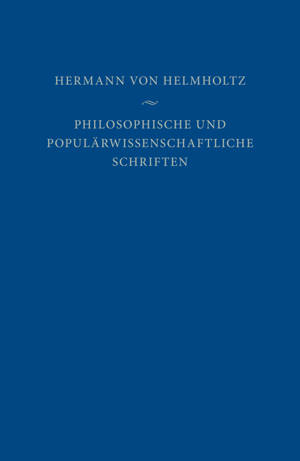
- Retrait gratuit dans votre magasin Club
- 7.000.000 titres dans notre catalogue
- Payer en toute sécurité
- Toujours un magasin près de chez vous
- Retrait gratuit dans votre magasin Club
- 7.000.0000 titres dans notre catalogue
- Payer en toute sécurité
- Toujours un magasin près de chez vous
97,95 €
+ 195 points
Description
Aus dem vielfältigen Werk von Hermann von Helmholtz versammelt diese Ausgabe die im engeren Sinne philosophischen Abhandlungen, vor allem zur Wissenschaftsphilosophie und Erkenntnistheorie, sowie Vorträge und Reden, bei denen der Autor seine Ausnahmestellung im Wissenschaftsbetrieb nutzte, um die Wissenschaften und ihre Institutionen in der bestehenden Form zu repräsentieren und zu begründen.Ein Philosoph wollte Helmholtz nicht sein, aber er legte der philosophischen Reflexion wissenschaftlicher Erkenntnis und wissenschaftlichen Handelns große Bedeutung bei. Vor allem bezog er, in der Regel ausgehend von seinen fachwissenschaftlichen Forschungen, in den verschiedensten Kontexten zu erkenntnistheoretischen und methodologischen Problemen der Wissenschaften Stellung. Bereits »Ueber die Erhaltung der Kraft« (1847) lässt erkennen, wie verwoben naturwissenschaftliche Grundlagenforschung und philosophische Grundlagenreflexion in seinem Werk sind. Die aus den frühen sinnesphysiologischen Forschungen hervorgegangene empiristische Wahrnehmungslehre trug ihm den Ruf ein, ein maßgeblicher Vertreter des Neukantianismus zu sein. Spätere Arbeiten v.a. zur Geometrie und Arithmetik - das zeigt die vorliegende Ausgabe - stellen jedoch eine radikale Absage an den konstitutiven Kern des Kantianismus (nämlich die Existenz synthetischer Urteile a priori) dar.Helmholtz' philosophische Beiträge sind bisher in ihrer Vollständigkeit nicht annähernd so gut zugänglich wie sein naturwissenschaftliches Werk. Die Ausgabe enthält außerdem bibliographische Vorberichte zur Einordnung, detaillierte Namens- und Sachregister sowie mit 575 Einträgen für den Zeitraum zwischen 1842 und 2012 die erste umfassende Bibliographie von Helmholtz verfasster Werke überhaupt.»Ich glaube, dass der Philosophie nur wieder aufzuhelfen ist, wenn sie sich mit Ernst und Eifer der Untersuchung der Erkenntnissprocesse und der wissenschaftlichen Methode zuwendet. Da hat sie eine wirkliche und berechtigte Aufgabe.«Helmholtz in einem Brief um 1875This edition collects the philosophical treatises from the diverse works of Hermann von Helmholtz, focusing particularly on the philosophy of science and epistemology. Included as well are lectures and speeches in which the author used his exceptional position in the scientific world to represent and motivate the sciences and their institutions in the form we recognize today.Though Helmholtz did not seek to be a philosopher, he attached great importance to the philosophical reflection of scientific knowledge and action. In particular, he regularly referred in various contexts to the epistemological and methodological problems of science that arose in his own research efforts. The interwoven nature of basic research in the natural sciences and basic philosophical reflection in Helmholtz's work is already noticeable in Ueber die Erhaltung der Kraft (1847). His empirical theory of perception, which emerged from earlier psychophysiological research, earned him the reputation of being a significant advocate of Neo-Kantianism. However, later works on particularly geometry and arithmetic represents - as the present edition shows - a radical rejection of the constitutive core of Kantianism (i.e. the existence of synthetic a priori judgments).Helmholtz's philosophical contributions have not, until now, been nearly as accessible as his work in the natural sciences. This edition contains, in addition to his philosophical work, bibliographical reports concerning classification, a detailed register of names and subject matter, as well as the first comprehensive bibliography of works written by Helmholtz, with over 575 entries corresponding to the period of 1842-2012.Hermann von Helmholtz (1821-1894) is considered to be one of the last polymaths to have lived. He began studying medicine and taught as professor for physiology in Berlin, Königsberg, Bonn, and Heidelberg before becoming a full professor in physics in Berlin. Helmholtz held a lifel
Spécifications
Parties prenantes
- Auteur(s) :
- Editeur:
Contenu
- Nombre de pages :
- 1391
- Langue:
- Allemand
Caractéristiques
- EAN:
- 9783787328963
- Format:
- Livre relié
- Format numérique:
- Linnen over kaft
- Dimensions :
- 250 mm x 230 mm
- Poids :
- 2547 g

Les avis
Nous publions uniquement les avis qui respectent les conditions requises. Consultez nos conditions pour les avis.






